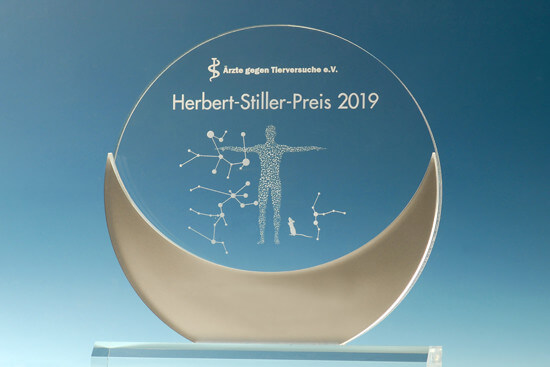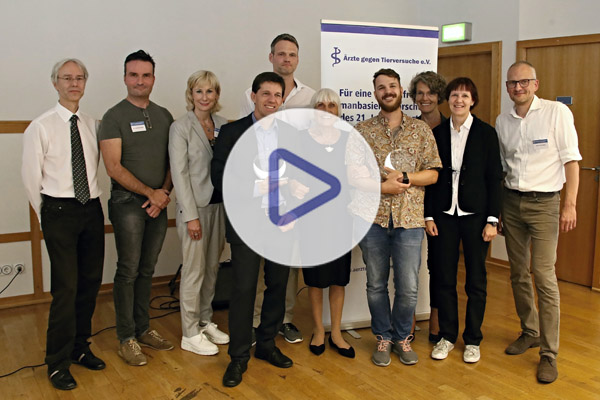Herbert Stiller Research Grant 2019
For the first time since 2011, the Herbert Stiller Research Grant (HSP) is awarded by the NGO Doctors Against Animal Experiments (DAAE) for outstanding innovative scientific works, which contribute to the investigation and treatment of human diseases through the application of animal-free, human-based methods and significantly contribute to the medical progress. For this purpose, in vitro studies, but also clinical works and epidemiological studies on the causes of diseases of affluence are being considered.
The Research Grant is named after a co-founder of the DAAE, Dr Herbert Stiller M.D. (1923-1984), doctor for neurology, psychiatry and psychotherapy, and had been awarded 7 times in the 1990s and 2000s. Thanks to earmarked sponsorship funds, a new edition was made possible in 2019. The amount of the grant is € 20,000.
Application Criteria
Unlike in the past, the 2019 grant is not being awarded retrospectively for already completed research projects, but represents a financial grant for planned research projects in the field of medicine and biosciences within Germany and the German-speaking countries. The planned research must not include any animal experiments and no animal material may be used (e.g. fetal calf serum or animal-derived antibodies). The research project may involve in vitro, in silico, clinical or epidemiological methods. The project should address a new, innovative topic or develop a novel methodical approach. Applicants should identify themselves with the principles and objectives of DAAE.
The winners
1st Place

Title: Clean Bioprinting - Animal-Free Production, Cultivation and Characterization of 3D Organ Models
Winner: Prof Dr Jens Kurreck and Dr Johanna Berg
Department: Technical University Berlin, Department of Applied Biochemistry
Summary: In the context of tissue culture, 3D bioprinting is considered to be a particularly promising technology that enables spatial positioning of human cells and thus the generation of three-dimensional human organ models. Although this technique represents a first step towards improving animal welfare, it is still inadequate. In commercially available printing substances (bio inks) numerous animal derivatives are used, i.e. fetal calf serum (FCS), as well as printing components such as animal gelatine and matrigel, a substance derived from mouse tumors.
Therefore, the aim of the present project is to develop a clean bioprinting process that produces humanized organ models without the use of any animal components. For this purpose, printing inks made from non-animal biopolymers are optimized. These are mixed with human lung cells, which are cultivated in an animal-free environment. The printed 3D lung models are used to perform virus inhibition experiments. Beyond the 3D bioprinting, the results of this project are also relevant for the cultivation of stem cells and 3D tissue models in general, as so far here the animal components mentioned above are commonly used. Furthermore, at various levels the concepts of this work are directly incorporated into the education of students and doctoral candidates, thus raising the awareness about animal protection among young academics.
2nd Place

Title: Animal-free multiplexed 3D synovium-on-a-chip as rheumatoid arthritis disease model
Winner: Dr Mario Rothbauer
Department: Technical University Vienna, Austria, Cell Chip Group
Summary: In this project, a three-dimensional model of the human synovium is to be established, which is placed on a biochip supplied with a microfluidic system. The microfluidic system consists of tiny channels located on the chip that simulate the circulatory system. The innermost cell layer of joints, the synovial membrane, produces the so-called synovial fluid and is responsible for its composition. This viscous fluid contains all the cells, nutrients and biochemicals that are necessary for the joint. Inflammatory processes of the synovial membrane have a serious effect on the composition of the synovial fluid, and are therefore directly related to the development and progression of rheumatoid arthritis. Animal experiments used in this field of research are cruel and very painful for the animals, and the results are poorly transferable to humans.
It is therefore essential to develop a human model that allows reliable, human-relevant research on rheumatoid arthritis. Such a model on a chip enables a rapid, reproducible way of working, which is essential to make the system attractive for wider use by other researchers. This also includes use in the industrial sector, for example in drug development. Using the microfluidic system, drugs can be administered in a targeted and controlled manner, and drug combinations can be systematically tested. The synovium-on-a-chip model is generated based on cells from healthy people, as well as patients suffering from rheumatoid arthritis. Inflammatory processes resulting from the disease are being investigated. In contrast to existing in vitro systems, this human cell model is completely free of components of animal origin such as fetal calf serum (FCS).
The award ceremony
After reviewing numerous excellent research applications, the winners were announced on September 14, 2019 as part of the 40th anniversary of our organization in Frankfurt am Main, and the two funded research projects were presented.
The sponsors
Special thanks go to the sponsor Florian Buchner, who made the reissue of the HSP 2019 possible with a generous earmarked donation. Selecting the winners of the HSP 2019 was difficult because of the numerous excellent applications, all of which have the potential to directly prevent animal suffering.
Because of the outstanding quality of the applications, we launched a call for donations for a second place. The call was successful and we were able to award two grants of € 20,000 each. Many thanks to the Maria Friedrich-Grundler Foundation, the Charlotte and Carl Georg Maier Foundation, the Doris and Wolfgang Rose Fund of the community foundation Dresden, Andreas Kesseler (Nutrition-Plus Germany), Nina Rettberg and other sponsors who prefer to remain anonymous. All of our sponsors have contributed to a major step towards cruelty-free and highly efficient research and medicine!
Video and photos
Photos: Photo album on Facebook >>
20.09.2019
Dr Corina Gericke DVM
Photos: Foto-Digital-Studio Marcus Müller


